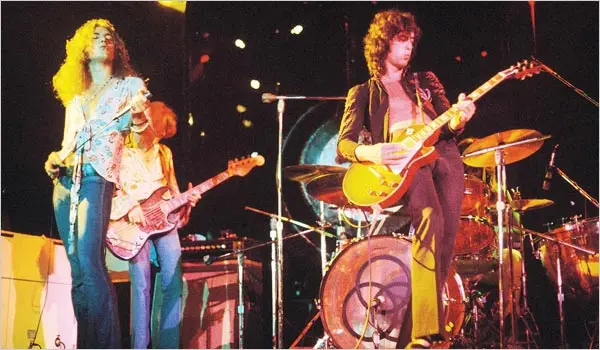Introduction
Led Zeppelin was one of the most influential and pioneering rock bands of the 20th century. Formed in 1968, the British group redefined rock music by blending blues, folk, and hard rock into a powerful and dynamic sound. Their groundbreaking approach to music, masterful instrumentation, and larger-than-life presence established them as one of the most successful and revered rock bands of all time.
Formation and Early Years (1968-1969)
- Led Zeppelin was formed in London in 1968 by guitarist Jimmy Page, vocalist Robert Plant, bassist/keyboardist John Paul Jones, and drummer John Bonham.
- Initially, Page sought to continue The Yardbirds’ legacy, recruiting Plant, Jones, and Bonham for a new lineup that was originally called The New Yardbirds.
- They quickly changed their name to Led Zeppelin, inspired by a joke from Keith Moon of The Who, who predicted the band would “go down like a lead balloon.”
- Their self-titled debut album, Led Zeppelin (1969), fused blues and hard rock, setting the foundation for their future success.
Rise to Fame (1969-1971)
- The release of Led Zeppelin II (1969) established their signature sound with heavy guitar riffs and intricate blues influences. The album featured the iconic “Whole Lotta Love,” which became a defining song of hard rock.
- Their third album, Led Zeppelin III (1970), showcased their versatility, incorporating folk and acoustic elements, with tracks like “Immigrant Song” and “Since I’ve Been Loving You.”
- Led Zeppelin IV (1971), their most commercially successful album, featured timeless classics like “Stairway to Heaven,” “Black Dog,” and “Rock and Roll.” “Stairway to Heaven” became one of the most celebrated rock songs of all time.
Peak and Global Domination (1972-1975)
- Houses of the Holy (1973) further expanded their musical experimentation, blending progressive rock and reggae elements in tracks like “The Song Remains the Same” and “D’yer Mak’er.”
- Their double album, Physical Graffiti (1975), was a commercial and critical triumph, including hits such as “Kashmir” and “Trampled Under Foot.”
- Led Zeppelin became one of the biggest touring bands in the world, setting attendance records and pushing the boundaries of rock concert production.
Challenges and Tragedy (1976-1980)
- Following the release of Presence (1976) and The Song Remains the Same (live soundtrack, 1976), the band faced personal and professional challenges, including Robert Plant’s severe car accident in 1975.
- In Through the Out Door (1979) marked their final studio album, reflecting a shift toward keyboard-driven compositions.
- In 1980, tragedy struck when John Bonham died after an alcohol-related incident. The band disbanded shortly after, stating that they could not continue without him.
Led Zeppelin – Immigrant Song (Official Audio)
Led Zeppelin – Rock And Roll (Alternate Mix) (Official Music Video)
Led Zeppelin – Whole Lotta Love (Official Music Video)
Led Zeppelin – Black Dog (Official Audio)
Led Zeppelin – Stairway To Heaven (Official Audio)
Led Zeppelin – Good Times Bad Times (Official Audio)
Led Zeppelin – Going To California (Official Audio)
Led Zeppelin – Ramble On (Official Audio)
Kashmir (Remaster)
Led Zeppelin – Over the Hills and Far Away (Official Music Video)
Legacy and Influence
- Led Zeppelin’s music continues to influence generations of rock, metal, and blues artists. Bands such as Guns N’ Roses, Metallica, Pearl Jam, and The White Stripes cite them as a major inspiration.
- The band’s influence extends beyond music, impacting fashion, album cover art, and live performances.
- Their music has been heavily sampled and covered, proving their lasting relevance in modern music.
Social and Cultural Impact
- Pioneers of Heavy Rock and Metal: Their loud, riff-driven music paved the way for hard rock and heavy metal.
- Live Performance Revolution: Their stadium tours in the 1970s set new standards for rock concerts, inspiring theatrical stage productions.
- Music Business Innovations: Led Zeppelin was among the first bands to negotiate full creative control over their recordings and establish lucrative touring deals.
- Mythology and Mysticism: The band’s association with occult themes, mystical lyrics, and Jimmy Page’s fascination with Aleister Crowley fueled fan speculation and intrigue.
- Enduring Popularity: Their music remains widely streamed, with Led Zeppelin IV alone selling over 37 million copies worldwide.
Reunions and Recognition
- Despite disbanding in 1980, Led Zeppelin has reunited sporadically, most notably for Live Aid (1985), the Atlantic Records 40th Anniversary Concert (1988), and the Celebration Day reunion at the O2 Arena (2007).
- They received a Grammy Lifetime Achievement Award (2005) and were honored at the Kennedy Center Honors (2012).
- Their music remains a staple in rock history, securing their place as one of the greatest bands of all time.
Conclusion
Led Zeppelin’s blend of power, musicality, and innovation shaped rock music forever. Their legacy continues to inspire new artists, while their songs remain timeless anthems of rebellion, mysticism, and pure rock energy.
Led Zeppelin’s official YouTube home:
https://www.youtube.com/@ledzeppelin/featured
References
- Wall, Mick. When Giants Walked the Earth: A Biography of Led Zeppelin. St. Martin’s Press, 2008.
- Lewis, Dave. Led Zeppelin: The Complete Guide to Their Music. Omnibus Press, 2010.
- Welch, Chris. Led Zeppelin: Dazed and Confused. Carlton Books, 2016.
- Rock and Roll Hall of Fame. “Led Zeppelin Induction, 1995.”
- Billboard. “The 100 Greatest Rock Bands of All Time.”
- RIAA. “Led Zeppelin Album Sales Statistics.”


Leave a Reply